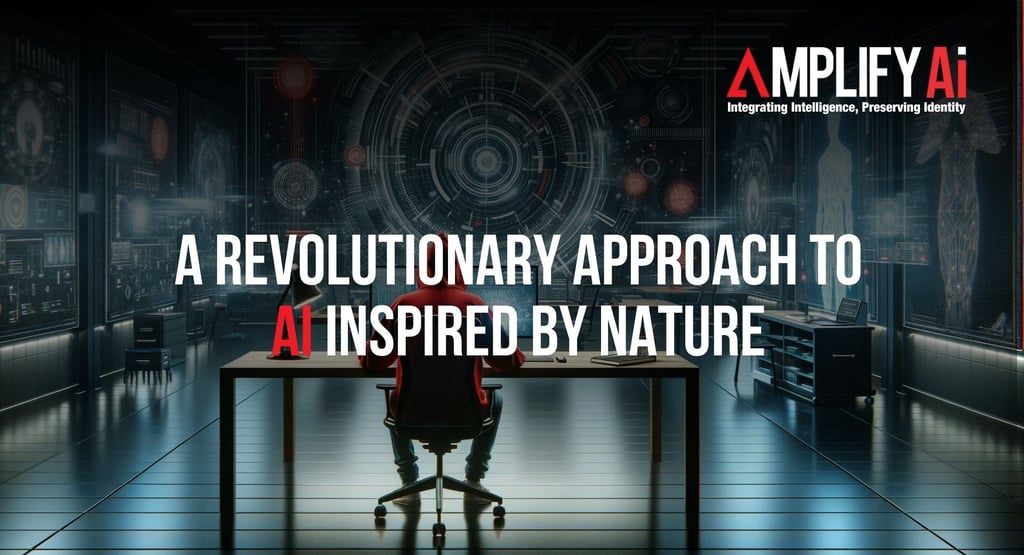A Revolutionary Approach to AI Inspired by Nature
Ronsley Vaz
4 min read


Jean-Philippe van Thiel, the founder and CEO of Axonjay.ai, is a true visionary when it comes to harnessing the power of artificial intelligence (AI) to drive innovation and solve real-world business challenges. With his unique perspective, Jean-Philippe has developed an approach that combines the brilliance of nature’s algorithm with cutting-edge AI technology. By looking to the natural world for inspiration, he has unlocked new possibilities and created practical solutions that are revolutionising industries. In this article, we delve into Jean-Philippe’s fascinating journey and explore how his nature-inspired AI algorithms are transforming the way we think about business operations and problem-solving. Prepare to be inspired by the remarkable fusion of AI and nature’s wisdom as we uncover the secrets behind Jean-Philippe’s ground-breaking work at Axonjay.ai.
Nature as Inspiration for AI
Jean-Philippe’s approach to AI is truly fascinating. He believes in the power of nature and draws inspiration from it to solve real-world business problems with AI technology. It’s like blending the wisdom of birds with cutting-edge technology, creating a unique and innovative perspective. I was captivated by his passion for ornithology and how he seamlessly connects the intelligence of nature with the possibilities of AI. It’s a refreshing and thought-provoking conversation that reminds us to look beyond the confines of traditional thinking and explore the boundless potential of nature’s algorithm.
One of the fascinating things Jean-Philippe ML Schepens van Thiel shares is the idea that nature itself is like one giant algorithm constantly adapting and learning. It’s incredible to think that the earth itself is the ultimate example of successful reinforcement learning. We can take inspiration from nature’s algorithm and apply it to our own algorithms, allowing us to explore uncharted territories in the realm of AI. So, let’s embrace the wisdom of nature and create algorithms that push the boundaries of what is possible!
Simplicity in AI
Jean-Philippe’s perspective on simplicity resonates deeply with me. I couldn’t agree more that in our fast-paced world, finding elegant and simple solutions is key to achieving success. As he emphasises, complexity often hinders progress, while simplicity allows us to accomplish more with less. It’s a reminder for all of us to strip away unnecessary layers and focus on what truly matters in order to thrive in our endeavours.
Mapping Everything
Jean-Philippe brings up a great point about the importance of mapping everything out when we’re faced with complex problems. It’s like creating a roadmap that guides us through the twists and turns of our journey. And you know what makes this mapping process even more powerful? Engaging with others and tapping into their wisdom. By collaborating and seeking different perspectives, we can transform our map into a rich tapestry of ideas, ultimately leading us to the heart of the matter. It’s all about embracing the multidimensional nature of problem-solving and uncovering the essence that lies within. So, let’s grab our pens and start mapping our way to clarity!
Axonjay.ai and Predicting the Behaviour of Companies
Jean-Philippe’s company, Axonjay.ai, uses AI to predict the behaviour of companies based on their online signals. The company uses a simple cocktail of 10 to 15 signals to predict the behaviour of companies and then alters the cocktail based on customer feedback. This results in an evolutive model that can predict the behaviour of companies. The company’s approach to AI is ethical and sustainable. Jean-Philippe believes that we should not try to alter nature with our brains but rather look to nature for solutions to our problems. By using a simple cocktail of signals to predict the behaviour of companies, Axonjay.ai is able to achieve results that are both effective and sustainable.
Looking to Nature for Solutions Jean-Philippe uses a variety of examples to illustrate his point that we should look to nature for solutions to our problems. He points out that the rainforest is the ultimate ecosystem, where everything is upcycled and downcycled without any by-product. He also notes that bird migration is a perfect example of entropy, where things flow to where the least energy is needed.
The Potential of AI
Jean-Philippe believes that AI has the potential to solve some of the world’s biggest challenges, from climate change to healthcare. He sees AI as a tool that can help us understand complex systems and find innovative solutions to problems. However, he also believes that we need to be careful in how we use AI and that we should always strive to use AI in an ethical and sustainable way.
One area where Jean-Philippe sees AI having a big impact is in healthcare. He believes that by using AI to analyse medical data, we can identify patterns and insights that can help us develop new treatments and cures for diseases. He also sees AI playing a role in improving healthcare outcomes by helping doctors make better decisions and providing personalised treatment plans for patients.
Another area where Jean-Philippe sees AI having a big impact is in climate change. He believes that AI can help us develop more effective renewable energy systems, predict weather patterns with greater accuracy, and help us understand the impact of climate change on ecosystems and wildlife.
The Importance of Ethics in AI
Jean-Philippe believes that ethics should be at the forefront of AI development. He sees AI as a tool that can be used for good or for bad and that it’s up to us to ensure that we use AI in an ethical and sustainable way.
One area where ethics is particularly important is in the development of autonomous weapons. Jean-Philippe believes that we should ban the development of autonomous weapons, as they pose a significant threat to human life and safety. He also believes that we need to ensure that AI is used in a way that respects human rights and dignity.
In conclusion, Jean-Philippe’s approach to AI is refreshing in its simplicity and effectiveness. He draws inspiration from nature and believes that the answer to many of our problems can be found in the natural world. By mapping everything out and talking to other people to get their input, he creates a multidimensional map that helps him arrive at the essence of a problem. This approach is ethical and sustainable, and it is a model that many other companies could learn from.
As AI continues to advance, it’s important that we use this technology in a way that benefits humanity. We need to ensure that AI is used ethically and sustainably and that it doesn’t pose a threat to human life and safety. By following Jean-Philippe’s example and looking to nature for inspiration, we can develop more effective AI systems that help us solve some of the world’s biggest challenges.
Subscribe to the podcast
Subscribe now to "Amplify Ai" and let's set sail together on this exciting voyage towards business growth and success.



